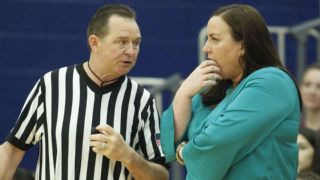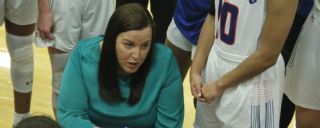|
It's a pleasant Thursday evening in late winter and I'm riding shotgun with Donna Finnie on a treasure hunt. We've traveled 190 miles from the modern campus of Houston Baptist University to this high school in a corner of San Antonio where a unique head coach in American collegiate basketball has come to evaluate a potential recruit. An eight-hour round-trip -- "They say everything in Texas is bigger and they're right," she grins -- merely to talent-spot. Several rivals are also sat in the bleachers of this gym. Chat is at a premium. A poker game. All hoping to win big. Yet Finnie has already come out ahead on long odds. The only playcaller from overseas, male or female, to ever hold such a job in all of the NCAA's Division I. A trailblazer, who has traveled the lengthiest road into uncharted territory. Earlier this month, the 42-year-old Briton completed her sixth season overseeing HBU's women's hoops. She was an anomaly when she landed the role and still is. "It's the hardest for international coaches," she says. "There are so many of them who want to make the breakthrough into the U.S. They ask, 'How did you do it?' "It isn't easy. You really have to rely on someone giving you an opportunity. I forget sometimes that I was given an opportunity. But I had to work for it." The native of Edinburgh never intended to follow this path when she cut her teeth in charge of Scotland's junior national squads in European basketball's lowest tiers. Finnie had spent a year abroad as a student at Lamar University in Texas and made their team on a special scholarship. It was a total culture shock, she confesses -- practicing every day, lifting weights, focused preparation. "At first, it was tough for me because I wasn't used to it. I embraced it, and it was tough when I came home and went back to practicing twice a week." It did whet the appetite. Some valuable insights. A model she could try to replicate on a smaller scale back on home soil. And the knowledge that if she had benefited from a trans-Atlantic detour, then surely others could too. National team coaching at the youth level is normally a passion rather than a resumé-builder. Scotland had to fund-raise from parents and friends to finance their tournament entries. Finnie wanted to maximize the return on those investments. She made calls and called in favors. A group was taken to Texas for a summer event. Recruiters took notice. Contacts were made and seeds planted. "I came away realizing, 'This is for me, I love coaching,' " says Finnie. "A friend of mine, Larry Tidwell, was an associate head coach at Texas Christian University, and he really helped shape my path. "He taught me about the recruiting process and the ins and outs of college basketball. Seeing how he worked showed me that I could integrate myself. If I got an opportunity, I could do it. But no one had done it before. And I thought, 'How is that going to happen?'" In business, as in sports, it is all about networking. Finnie would use vacation time to go to the United States and watch practices, picking up insights from the likes of the late, great Pat Summitt in Tennessee and elsewhere. Meet people, trade numbers, hope for a break. The phone rang and it was Mary Gleason, an old ally who had landed the head coaching role at HBU and had an opening for an assistant. "I was kind of shocked when I got the offer," she laughs. A brief moment of self-doubt crept in. Her boss at the time offered reassurance. "He told me about all the things I'd done before. It was just a different scale."  Three years later, she would succeed Gleason. Her own program, her own responsibilities. "Our Athletic Director Steve Moniaci has been extremely supportive," she adds. "I don't think it's ever been looked at as 'she's got a different accent or she's from a different country'. They said, 'Let's give her a chance.' " There are undeniable contrasts from her origins in basketball. Yet, she claims, the challenges of coaching for free on teams playing in front of no one have plenty in common with the daily diary within the multi-million dollar world of NCAA hoops. "One thing that's so evident to me about the coaching model in the USA is that people get jobs and they have no coaching experience," she says. "They'll come out of college as a player and immediately get a job. "It's not just about the coaching experience. It's all the stuff you don't see, it's not the Xs and Os. It's managing a budget, managing staff, planning travel itineraries. All the things I had to do in Scotland as national team coach, all around my regular job. "Those life experiences really set me up for leading a collegiate program. People laugh and say, 'Well, what do you do when you're not in-season?' They don't see the other side of coaching that we have to do." Scouting is among them. HBU is one of the smaller schools in the Southland Conference, a universe removed from the UConns, Dukes and North Carolinas who seize the spotlight. Four-hundred-mile round trips, frequently longer, are required to unearth diamonds in the rough rather than the polished stones destined for national television and deep runs into the annual March Madness tournament. Finnie recognizes her niche. And it is back from where she came. Her team this season has included players from Uzbekistan, Luxembourg, Australia and Poland. More imports have signed on for next year. It is a global game. International stars proliferate in the NBA and NCAA. The NBA now has its first "foreign" head coach in Igor Kokoškov, the Serb running the sideline for the Phoenix Suns. Talent is talent, from wherever it comes. However, says Finnie, others deserve their shot to follow her lead. Now a prominent member of the Women's Basketball Coaches Association, she will organize a first-ever meeting of its new international chapter at next month's Final Four in Tampa. They are mainly Europeans, with a few others thrown in. "We want to share info and help other international coaches who are here or who'd like to be here," she confirms. "Because we've all gone though these processes, dealing with visas, trying to get noticed. It is hard but maybe we can make it easier." Then again, the good things in life are worth grafting for. If it means travelling halfway around the world for a dream shot, then why not? "It is non-stop but that's why I did it: because I have the opportunity," says Finnie. "And I can't believe how much I've improved as a coach because I get to do it every day. "It's not something I do part-time. It's not a hobby. It's my career."
|

